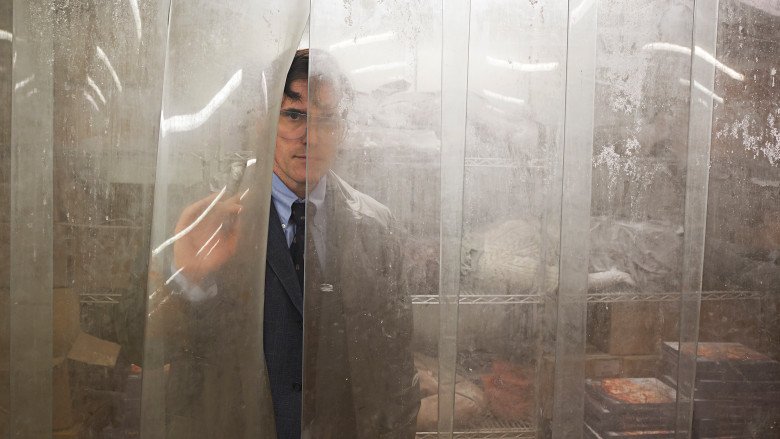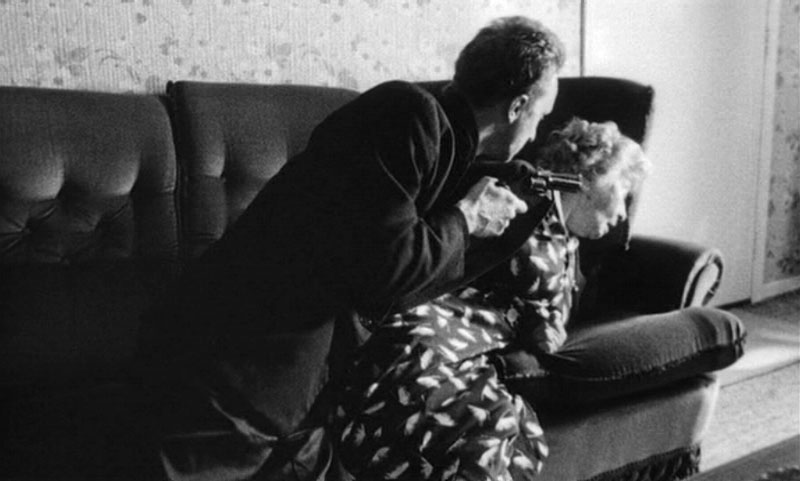6. Rampage (1987)

William Friedkin finished shooting Rampage in 1987, and screened it at the Boston Film Festival in September that year, but the movie wasn’t released theatrically in the US, as movie’s distributor De Laurentis Entertainment Group went bankrupt. It was finally released in the United States in 1992 by Miramax Films.
The movie is loosely based on the case of Richard Chase, a serial killer, who was known as “The Vampire of Sacramento” because he drunk his victims’ blood. While Richard Chase exhibited all components of the Macdonald triad, also known as the homicidal triad, which can predict violent tendencies, at the young age and was abused by his parents, the background of Charles Reece – Chase’s movie counterpart – is mainly absent.
What is present, however, is the attempt to justify his actions. Both claimed that they were forced to kill in order to survive. According to Chase he was a victim of Nazis and UFO conspiracy. While Charles Reece doesn’t provide any exact reason why he killed, he stands by the belief that he wasn’t responsible and that he was forced to kill. He even exclaims “I’m sorry”, before killing one of his victims.
Friedkin isn’t interested much in providing viewers with direct answers to the question what made his character kill. But knowing the story the movie is based on, will help the viewer understand that what we see is how a normal world can be seen as threatening for the demented mind.
7. The House That Jack Built (2018)

The latest offering from Lars von Trier is one of the most typical representation of how the psyche of serial killer. Jack – portrayed by Matt Dillon – is failed architect, who reveals his story through the five key incidents (murders) that made him a serial killer. In this film you can find all the justification of their actions that serial killers can provide you with.
From one of the victims being that irritating that made him kill her to having an attitude to his murders as an art. From the fact that “nobody wants to help” his victims to the point that he no longer cares whether his actions are right or wrong.
Throughout his life Jack was trying to build a house, but in the end that house is just his body count. The movie tests the viewers’ own sense of normality, as throughout the film viewers can’t help but feel some kind of weird sympathy to Jack, who even in hell doesn’t feel any remorse for his actions.
8. Citizen X (1995)
Andrei Chikatilo is arguably the most famous serial killer of the Soviet Union. He had murdered over 50 people between 1978 and 1990. Generally, movies based exactly on true events often suffer from being not that faithful to their source material. However, that wasn’t the case with HBO’s “Citizen X” (1995).
The movie is based on the non-fiction book “The Killer Department” by Robert Cullen, who was working as a foreign reporter covering the issues related to the USSR, closely follows how soviet detectives tried to catch the notorious killer, while struggling with Soviet bureaucracy.
At first the viewers are exposed to what the team of detectives and psychiatrists think about the murderer, then the viewers learn how close they were to the truth. The murderer tried to justify his actions by being traumatized in his childhood by surviving the Holodomor. He also tried to justify his actions by observing his victims as déclassé elements, showing off himself as some kind of the “cleaner”.
9. Cruising (1980)

Can self-loathing become a reason for the murder? William Friedkin’s most controversial film proves that it can. While one may consider “The Exorcist” (1973) to be Friedkin’s most controversial film, this title truly belongs to “Cruising” (1980) – a movie, which was targeted by conservatives for promoting homosexuality, and by the LGBT-rights activists for promoting homophobia. And after watching the movie, you can kinda understand both parties.
Conservatives didn’t want to see a major motion picture showing gay leather bars, while LGBT-rights activists didn’t want to see a movie that seemingly links homosexuality to sex-obsession and murder tendencies. “Seemingly” is the keyword.
The movie follows an undercover cop, who investigates the series of murders in gay leather bars. In the end the killer seems to be caught, but is he? Once again, William Friedkin doesn’t provide us with clear answer. Was the actual killer got caught? Or maybe it is the protagonist who is the killer? The only obvious thing in the movie is that the killer, whoever he is, is a latent homosexual, whose own fear of accepting himself for who he is forces him into killing others.
10. Man Bites Dog (1992)

Now, we are returning to the very first question of the article “Why we are so fascinated with serial killers?”. The Belgian mockumentary “Man Bites Dog” suggests that it is media frenzy created by the journalists that makes us so interested in serial killers.
The film follows a group of documentary filmmakers who follow Ben, a charismatic and witty serial killer, on his bloody rampage. The movie’s point is that journalists may be as guilty as the serial killers are. The documentary crew are so obsessed with the sensationalism that in the certain way they become Ben’s complicits, which leads to meeting their fate.